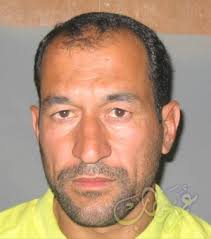|
Abu Abdulrahman al-Bilawi
Adnan Ismail Najm al-Bilawi Al-Dulaimi (Arabic: عدنان إسماعيل نجم البيلاوي الدليمي 1971 – 4 June 2014), better known by the nom de guerre Abu Abdulrahman al-Bilawi al-Anbari[1] (Arabic: أبو عبد الرحمن البيلاوي الأنباري), was a top commander in the Islamic State of Iraq and the Levant and the head of its Military Council, prior to his killing by Iraqi security forces on 4 June 2014.[3][4] BiographyAl-Bilawi belonged to the Al-bu Bali clan of the Dulaim, the largest tribe in the Iraqi Al Anbar Governorate. His tribe formed the nucleus of the resistance/insurgency against U.S. forces in Iraq. The Dulaimis returned to the armed insurgency in 2014. The governor of Anbar at the time, Ahmad Khalaf al-Dulaimi, claimed that he taught al-Bilawi when they were both at the Iraqi Military Academy. Al-Bilawi graduated in 1993 and went on to become an infantry officer in the Iraqi military, achieving the rank of captain.[2][4] After the US-led 2003 invasion of Iraq, al-Bilawi joined al-Qaida in Iraq and worked closely with its then-leader, Abu Musab al-Zarqawi. According to an audio address by ISIL' official spokesman Abu Mohammad al-Adnani released on 11 June 2014, al-Bilawi was one of the founders of Jama'at al-Tawhid wal-Jihad and trained many jihadists during the insurgency.[1] Najm al-Bilawi was detained by American forces in 2005 in Camp Bucca.[2][5][6] Al-Bilawi was one of the approximately 500 prisoners who escaped from Abu Ghraib prison in July 2013, following a raid and mass jailbreak by members of the Islamic State of Iraq and the Levant.[7][8] Following his escape, he became a member of ISIL's Military Council and had a major role in planning and leading the group's military offensive in Northern and Central Iraq.[5] Al-Bilawi was killed on 4 June 2014 in a raid by Iraqi security forces in Mosul. Following his death, a laptop belonging to al-Bilawi revealed high quality intelligence on the operations and leadership structure of ISIL.[9] Al-Bilawi had been leading the planning for a military operation against Mosul, following his death ISIL launched the attack, resulting in their total seizure of the city by 9 June 2014. The attack was named the "Invasion of Asadullah al-Bilawi Abu Abdul Rahman" in his honour.[10] His death was acknowledged by ISIL's official spokesman, Abu Mohammad al-Adnani, in a June 2014 statement that praised his contributions to the group.[5] He was reportedly succeeded by Abu Muhannad al-Suwaydawi as leader of the ISIL Military Council.[2] References
|
||||||||||||||||||
